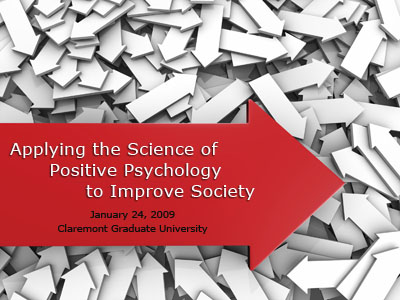Applying the Science of Positive Psychology to Improve Society

Positive Psychology emerged at the beginning of the new millennium as a movement within psychology aimed at enhancing human strengths and optimal human functioning. This emerging area of scholarship, scientific research, and application has inspired leading scholars and practitioners from across the globe to rethink the fundamental nature of how we live, work, and educate; of our health and well-being; of how to design and lead positive institutions; and how to develop positive public policies. The ideas contained in the initial work in positive psychology have spread far and wide across the disciplines to form a broader movement, sometimes referred to as the positive social and human sciences.
On January 24, 2009, Claremont Graduate University hosted a day-long event to celebrate the emerging positive social and human sciences, and to push their boundaries. Leaders and leading scholars from across the positive science landscape gathered in Claremont to discuss Applying the Science of Positive Psychology to Improve Society with a sold-out crowd in the packed Garrison Theater on campus.
Over 750 participants watched the event live. The standing-room-only crowd (who came from Australia, Ireland, China, Jamaica, New Zealand, and 8 of the United States) included university presidents, deans, and professors; researchers, clinical psychologists, and private consultants in applied psychology; the heads of major foundations; graduate and undergraduate students; and many enthusiasts from the private sector.
An additional audience across the globe participated online via a live webcast, some even staying up all night in Australia, Finland, Scotland, Hungary, and Estonia to watch, and others scattered across 13 of the United States.
A highlight from the meeting was the preview announcement of the 2009 Clifton Strengths Prize, to be given to Dr. Mihaly Csikszentmihalyi of Claremont Graduate University’s Division of Behavioral and Organizational Sciences. Dr. Csikszentmihalyi was awarded the $250,000 prize for his pioneering work in Flow Theory and Positive Psychology. This announcement, made by Dr. Connie Rath of the Gallup Organization, was made in advance of the formal awarding, which will be given later at a gala event in Washington, D.C.
Couldn’t Make It? Want to See it Again?
Claremont Graduate University is happy to offer streaming web video of the entire conference for those who were unable to join us. Access to the videos is available for $25 by following the link.
This work culminated in a book, Applied Positive Psychology: Improving Everyday Life, Schools, Work, Health, and Society by Stewart Donaldson, Mihaly Csikszentmihalyi, and Jeanne Nakamura, which is now available.
Click here to access to the entire online collection of videos.
As a preview, the first 45 minutes of this conference are available in the player below, including:
-
What Works in the Emerging Positive Social Sciences by Dr. Stewart Donaldson
-
the Past, Present, and Future of Positive Psychology by Dr. Martin Seligman
-
the announcement of the Clifton Strengths Prize by Dr. Connie Rath
-
acceptance remarks by Dr. Mihaly Csikszentmihalyi
-
a portion of a talk about the latest scientific findings from the science of happiness by Dr. Edward Diener
The Schedule
Conference Made Possible by:
The John Stauffer Charitable Trust and Division of Behavioral and Organizational Sciences at Claremont Graduate University
Conference Supporters:
International Positive Psychology Association
Greater Good Magazine
Los Angeles County Psychological Association
8:45-8:55 am
Welcome
Robert Klitgaard, President, Claremont Graduate University
8:55-9:25 am
Introduction: Determining What Works in the Emerging Positive Social and Human Sciences
Stewart Donaldson, Dean & Professor of Psychology, Claremont Graduate University including opening remarks via video by Martin Seligman, Fox Leadership Professor of Psychology, University of Pennsylvania
9:25-10:25 am
Happiness and Complete Wealth: Implications for Public Policy
Edward Diener, Joseph R. Smiley Distinguished Professor of Psychology, University of Illinois
10:25-10:55 am
Using Positive Emotions to Enhance Human Flourishing
Barbara Fredrickson, Kenan Distinguished Professor of Psychology, University of North Carolina, Chapel Hill
10:55-11:10 am
Morning Break
11:10 am-12:10 pm
Why Character Matters
Christopher Peterson, Professor of Psychology & Clinical Psychology Area Chair, University of Michigan
Nansook Park, Associate Professor of Psychology, University of Rhode Island12:10-12:40 pm
Panel One: Stewart Donaldson (moderator), Edward Diener, Barbara Fredrickson, Christopher Peterson, and Nansook Park
12:40-1:50 pm
Lunch
1:50-2:20 pm
How Positive Psychosocial Resources Enhance Health and Well-Being
Shelley Taylor, Distinguished Professor, University of California, Los Angeles
2:20-2:50 pm
Positive Psychology-Inspired Teaching in Public Schools
Hans Henrik Knoop, Research Director, Universe Research Lab; Associate Professor, University of Aarhus, Denmark
2:50-3:20 pm
Contexts of Positive Development in Adulthood
Jeanne Nakamura, Assistant Professor of Psychology, Claremont Graduate University
3:20-3:50 pm
Seeing the Possibilities in Positive Identities and Organizations
Jane Dutton, Robert L. Kahn Distinguished University Professor of Business Administration and Psychology, University of Michigan
3:50-4:10 pm
Afternoon Break
4:10-4:40 pm
The Effects of Positive Leadership on Organizational Performance
Kim Cameron, William Russell Kelly Professor of Management and Organizations, University of Michigan
4:40-5:10 pm
The Discovery and Design of Positive Institutions: How Organizations Magnify High Human Strengths Outward into Our World
David Cooperrider, Fairmount Minerals Professor of Social Entrepreneurship, Case Western Reserve University
5:10-5:40 pm
The Mind and Evolution: The Future of Positive Psychology
Mihaly Csikszentmihalyi, Distinguished Professor of Psychology, Claremont Graduate University
5:40-6:10 pm
Panel Two: Stewart Donaldson (moderator), Shelley Taylor, Hans Henrik Knoop, Jeanne Nakamura, Jane Dutton, Kim Cameron, David Cooperrider, and Mihaly Csikszentmihalyi
6:10-6:45
Wine and Cheese Reception with the SpeakersOpportunities will be given for audience members to pose their own questions about how to use the science of positive psychology to benefit societies across the globe. Undergraduate ScholarshipsCongratulations to the following undergraduates, who attended the conference as Stauffer Symposium Scholars:
- Jim Brillon (California State University, Fullerton)
- Rachelle Fenn-Vasquez (University of Arizona)
- Joseph P. Quinlan (University of Arizona)
- Eileen Ziccardi (University of Arizona)
Location, Directions, and Lodging
The event was held at:
Garrison Theater, the Claremont Colleges
231 E. 10th St.
Claremont, CA 91711
Want to Know More About Positive Psychology?
We currently offer M.A. and Ph.D. programs with concentrations in Positive Psychology.